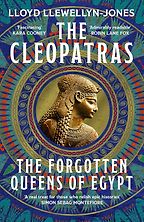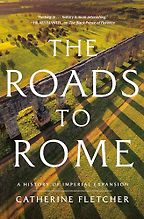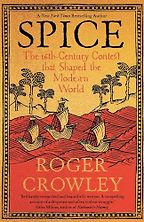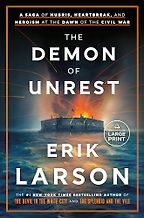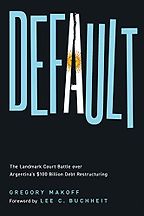Where I live, it’s now high summer. I’m always aware that my book choices reflect my personal interests, but that’s perhaps even more true than usual. These are books that have been published in the UK since April and I’ve gravitated towards reading over the holidays. Apologies in advance for all the excellent books I’ve missed out.
One of my favourite places to be is the ancient world and judging from the number of books published about it, I’m not the only one. The Cleopatras by Lloyd Llewellyn-Jones is about all the queens called Cleopatra: the one most of us know about being, in fact, Cleopatra VII. “The final century and a half of three millennia of male rulership in Egypt was a golden age for royal women, a period when queens finally came into their own,” he argues. You learn a lot about Ptolemaic Egypt as well as what was happening further East (the first Cleopatra was from Syria). Very striking is the marriage of brothers to their sisters within the royal family, and why that was seen as a good thing.
Another book that captured my attention was The Roads to Rome by Catherine Fletcher, which looks at the ancient road network across the Roman Empire but also across the centuries since they were built. It’s a travelogue, kind of: you join her going around Rome—including to the Via Appia Antica where, even today, the giant stones continue to give an idea of what parts of this 100,000-kilometer network of roads once looked like—and then out across 14 countries. It’s an account of how the roads captured people’s imagination, from writers like Goethe to dictators like Hitler.
One book I loved is Spice by British historian Roger Crowley (not the first book by that title I’ve read). It’s about the battle for spices in what is now Indonesia and focuses on the rivalry between Spain and Portugal over 60 years in the 16th century. That spices should be worth more than their weight in gold and prompt people to risk death exploring treacherous routes to get to them is a compelling story and Crowley tells it well. (I was particularly struck by the sailors who took part in Ferdinand Magellan’s disastrous voyage and then signed up to circumnavigate the world yet again).
Also in the early modern period, there’s a book called Cunning Folk by Tabitha Stanmore, about practitioners of magic in England. These were people you would consult if (for example) you lost a valuable object. Again, a snapshot of a past when things were both the same and yet very different.
If you like Italy and history, one book that’s a lot of fun is The Shortest History of Italy, by Ross King, author of Brunelleschi’s Dome. In 234 pages, it covers the entire history from Aeneas’s mythical arrival and the founding of Rome to the present. It’s really satisfying to have Italy’s history told as a whole rather than the Roman Empire/Renaissance/Risorgimento etc. as separate history books.
While we’re on the subject of short nonfiction books encapsulating vast swathes of knowledge in a couple of hundred pages, there’s a new book in the Little Histories series (inspired by Ernest Gombrich’s classic A Little History of the World, aimed at young adults). A Little History of Psychology by British psychologist Nicky Hayes takes psychology from its study under the Greeks to the present. In the Shortest History series economist Ian Goldin takes on migration.
There’s a genre of pacy nonfiction books that show up on US bestseller lists and are highly readable. Those published in the UK in the past few months include The Demon of Unrest, by Erik Larson, whose books have often been recommended on Five Books. It’s about the period of American history between Abraham Lincoln’s election and the beginning of the American Civil War. (Note that in the UK, the book’s subtitle is: ‘Abraham Lincoln and America’s Road to Civil War’: this is not a story we are as familiar with on this side of the Atlantic).
Also in that genre is Adam Higginbotham’s Challenger, about the 1986 space shuttle disaster. Space exploration is a topic I got into at the time of the 50th anniversary of the moon landings: the combination of what human beings are able to figure out, and then willing to risk trying out, is just something I find compelling. That space travel is not something I would do for love or money seems to add, rather than detract, from my interest in reading about people who do.
Though books by Michael Lewis are a great example, it’s often a challenge to make economics books entertaining, which is a pity as it’s such an important subject. Financial disasters are an exception. Default by Gregory Makoff takes on Argentina’s 2001 default, and the battle over the restructuring of $100 billion in debt. On the face of it, it seems like a niche subject, but it’s one way of getting insight into how capitalism works—the billions at stake and what some players do to get their hands on that money. Don’t dismiss Argentina as a faraway case of no relevance to the country you live in: some of those players are active in government and other debt near you. Perhaps they even own your country’s biggest bookstore chain.
August 6, 2024. Updated: June 24, 2025
Five Books aims to keep its book recommendations and interviews up to date. If you are the interviewee and would like to update your choice of books (or even just what you say about them) please email us at [email protected]
Five Books interviews are expensive to produce. If you've enjoyed this interview, please support us by donating a small amount.


